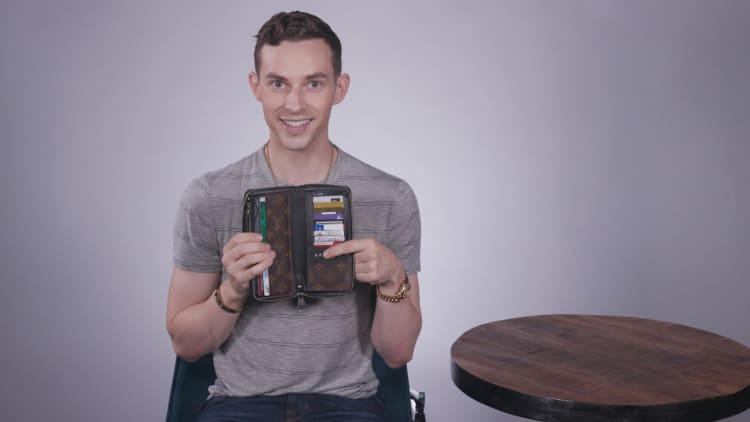Adam Rippon won a bronze medal for team figure skating in the PyeongChang 2018 Winter Olympics, but he should get a gold medal for how well he manages his finances.
"Once I started making enough money, I had a $25 a month deposit go right into a savings account," Rippon says. This is just one of the ways he proactively managed his finances when he was younger.
Rippon made history in 2018 as the first openly gay figure skater to compete at the Olympics. It's been less than a year since he retired from figure skating, but he's busier than ever. He won season 26 of "Dancing with the Stars: Athletes" and became a judge on the premiere season of "Dancing with the Stars Juniors."
Last month, Rippon launched his YouTube show, "Break the Ice," where he interviews guests, including "American Idol" semi-finalist Todrick Hall and Olympic skier Gus Kenworthy, and teaches them some skating skills. And, recently he partnered with Moët & Chandon to create the company's first champagne cocktail served over ice.
This month, Rippon was in New York City to discuss his new memoir, "Beautiful on the Inside," which comes out October 15. June marks gay pride month, and this year is particularly noteworthy since 2019 marks both the 50th anniversary of the Stonewall Riots and the first time WorldPride is being held in the U.S.
Rippon tells CNBC Make It he's grateful for all the people who've come before him and hopes to honor them with the actions he takes every single day. By sharing his own personal experiences in his memoir, Rippon hopes to help inspire readers who may relate to his journey.
Additionally, he says, "I want you to laugh at me, I want you to laugh with me."
For all his hustle, Rippon still finds time to practice good money management habits. CNBC Make It quizzed him on how he uses his credit cards, pays bills and saves money. He's almost as knowledgeable the topic of personal finance as he is on triple lutzes.
While you might never win an Olympic medal, you can copy some of Rippon's good money habits by following the 3 steps below.
1. Don't cancel credit cards
"I know that you're not supposed to cancel a credit card — it'll hurt your credit score," Rippon says.
This is true: Experts don't recommend closing credit cards. Your credit score can take a hit when a card is cancelled, especially if you close an old account.
The seemingly harmless action of cancelling a credit card can have lasting effects on two factors that make up your credit score. First, if you cancel a card you've had for a long time the average length of time you've had credit will decrease. For example, say you've had one card for four years and another for 10 years. If close the 10-year-old card, your average age of credit drops from seven years to four years.
Another major factor credit scoring models look at is your credit utilization rate (CUR). This is the percentage of credit you use. Simply divide how much you currently owe across all credit cards by your total credit limit on all cards to find your number. When you close a credit card, your available credit decreases, increasing your utilization rate. High utilization rates can damage your credit score, so it's best to keep it as low as possible.
2. Pay bills on time
When Rippon got his first credit card he would immediately pay it off every time he made a purchase. "As soon I got home I would open the app and transfer the money from my checking account to pay off the credit card," he says. "I never wanted to fall in debt."
Rippon was smart to treat his credit card almost like a debit card. By paying it off on-time and in-full, he avoided interest charges and late payment fees.
Plus, he helped his credit score. Payment history is the most important factor of your FICO credit score — making up 35% of your total score. When you pay on time, positive payment information is relayed to the three major credit bureaus (Experian, Equifax and TransUnion), which can improve your credit score.
3. Don't spend more than you can afford
"I have never bought anything that I couldn't afford," Rippon says.
It's about balancing responsibility with reward, he told CNBC Make It in an interview last year. "You should be saving money, you should be doing everything you can to plan for the future, but I think that it's important to celebrate what you have now."
Just make sure you can afford it.
Rippon evaluates things he wants to buy before purchasing them. "If I could cover all of my expenses for three to four months, then I was allowed to buy myself, like, a little treat."
It's crucial to have an emergency fund in order to protect yourself from unexpected expenses. Rippon had three-to-four months saved, but some financial advisors suggest having six to 12 months stashed away.
While your morning latte is probably not the reason you're struggling to make ends meet (see all that student loan debt and stagnant wages), when trying to save up an emergency fund it can be smart to avoid impulse purchases. A recent study found 44% of U.S. adults admit to making split-second purchases. And, that percent spikes to 80% for millennials and Gen Xers.
Take a page from Rippon's play book and avoid spending on things you don't really need.
"If I didn't have the money, I never bought it," Rippon says.
Don't miss: Drew Barrymore uses a Ziploc bag for a wallet—& here's the credit card she can't live without
Like this story? Subscribe to CNBC Make It on YouTube!



